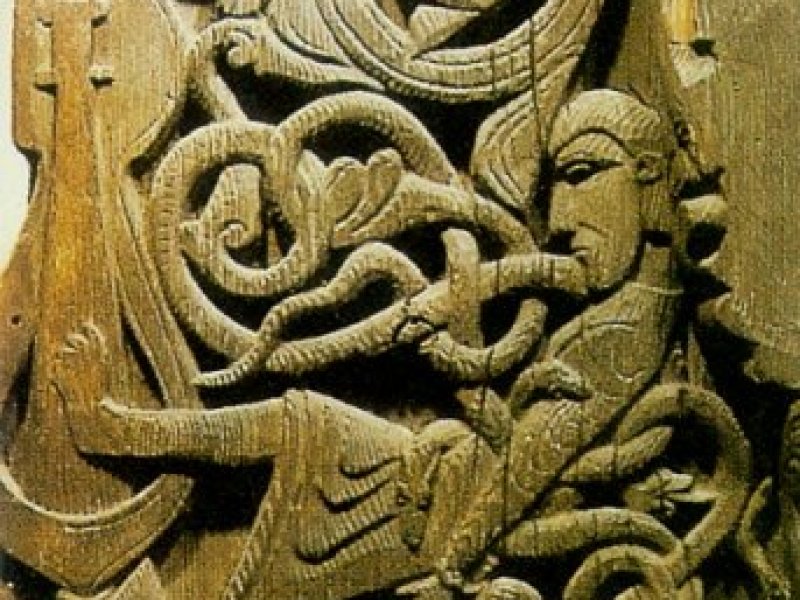Gunther
In the Nibelungenlied, Gunther (Gunnar) was the son of Dancrat and Uote (Uta). However, in Waltharius, Gunther was a son of Gibicho, instead of Dancrat. Gunther ruled as the king of Burgundy with his two brothers, Gernot and Giselher. Gunther was also the brother of Kriemhild (Gudrun or Grimhild).
His loyal henchman was his uncle, Hagen of Troneck (in the Thiðrekssaga however, Hogni was his half-brother, while in the Volsunga Saga, Hogni was his brother).
At Hagen's advice, Gunther befriended Siegfried, the hero from the Netherlands, who helped him in the war against the Saxons and Danes. Gunther agreed to marriage between his sister and Siegfried, in return asking that Siegfried would help him win Brunhild, the warrior-queen of Isenstein, in Iceland.
Gunther showed himself to be a great warrior in the second half of the poem, but his strength was no match for Brunhild. The only way Gunther could marry her was if he could defeat Brunhild in a contest of strength. Gunther and his followers would die if he were to lose. Gunther only defeated Brunhild, because of Siegfried's strength, and because the hero was also invisible. Brunhild had no choice but to marry Gunther.
The marriage to Brunhild proved to be unhappy and would seal doom for him and his family. On their wedding night, Brunhild humiliated Gunther by tying her husband with her girdle and hanging him on the wall until dawn. Again, Gunther gained Siegfried's help and the hero pretended to be her husband, overcoming the warrior-queen with his own strength, until she had surrendered to her husband (Siegfried in disguise). Before he let Gunther make love to his wife, Siegfried took Brunhild's ring and girdle (as trophy?), and gave them to Kriemhild. Gunther took Brunhild's virginity, thereby reducing her strength to that of an ordinary mortal woman.
When Brunhild found out the secret from his sister that it was Siegfried who won her with his strength for Gunther, she demanded revenge from her husband. Hagen agreed to assassinate Siegfried. At first, Gunther was reluctant, but finally agreed to Hagen's plan.
When Siegfried lay dying in the forest, Gunther wept for his brother-in-law, but Siegfried accused him of treachery and hypocrisy. The hero foretold Gunther's death and the destruction of his kingdom.
Kriemhild knew that his brother was involved in her husband's death, but they were reconciled at Hagen's advice, only because Hagen wanted the fabled Nibelung treasure brought to Worms. When Kriemhild started giving away the treasure, this irritated Hagen, who was determined to steal her treasure. Gunther knew of Hagen's plan, but looked the other way. To ensure that Kriemhild could not use the treasure, Hagen sank the treasure into in the Rhine River. But later in the poem, all three brothers knew of the treasure's location, and they had sworn not to reveal its location while one of the kings was still alive.
Hagen was against the marriage between Kriemhild and Etzel, the king of Hungary. Hagen feared that Kriemhild would have powerful allies that would destroy him and the brothers. Gunther and his brothers dismissed Hagen's claim and approved the marriage.
When Etzel invited Gunther and his brothers to a midsummer festival, Hagen was against the visit. They would not be persuaded from visiting their sister. So Hagen decided to accompany the brothers with an armed escort.
Upon their arrival at Etzel's capital, Gunther realised that his sister was plotting to kill Hagen, and even bring destruction upon her brothers and people. Hagen inflamed the situation when he killed Ortlieb, the son of Etzel and Kriemhild. When fighting erupted between Hagen and the Hunnish warriors, he and his brothers had no choice but to fight with the beleaguered warriors.
Gunther and his warriors managed to repel their attackers. Dietrich and Rudiger, along with their retainers, tried to remain neutral. However, Rudiger was reluctantly drawn into the conflict because of his promise to Kriemhild and his fealty to Etzel. Gunther's brother, Gernot and Rudiger killed one another in the fighting.
Dietrich's men (Amelungs) were drawn into a conflict when they went to recover Rudiger's body for burial. Volker, a Burgundian ministrel, provoked Amelungs into battle. Gunther's youngest brother Giselher was killed, and that wiped out the two sides. Only Hildebrand survived on the Amelung side, while the only survivors on the Burgundian side were Gunther and Hagen.
Dietrich then became involved in the fighting against Gunther and Hagen. Dietrich offered them safe passage if they surrendered, which Gunther and Hagen rejected, because they would be branded as cowards. Dietrich overcame first Hagen, then Gunther; they were bound and delivered to Kriemhild.
Kriemhild was happy now that she would gain her revenge for the death of her first husband, Siegfried. Dietrich asked her to spare them, before he left her alone with the prisoners to fetch Etzel. Gunther was killed; his severed head was brought to Hagen, when Hagen defiantly refused to disclose the location of her treasure. When Hagen still refused, she killed Hagen with Siegfried's sword, Balmung. Hildebrand executed Kriemhild for killing Hagen.
Unlike in the Nibelungenlied, the Volsunga saga and Thiðrekssaga said that Gunnar (Gunther) was killed in the snake pit. In the Volsunga saga, Gunther was the last to die, but it was Atli (Etzel) who ordered his death when he refused to reveal the location of the treasure. In the Thiðrekssaga, the same thing happened as in the Nibelungenlied, captured by Thidreks (Dietrich), but it was Giselher who was the last to die.
By Jimmy Joe


